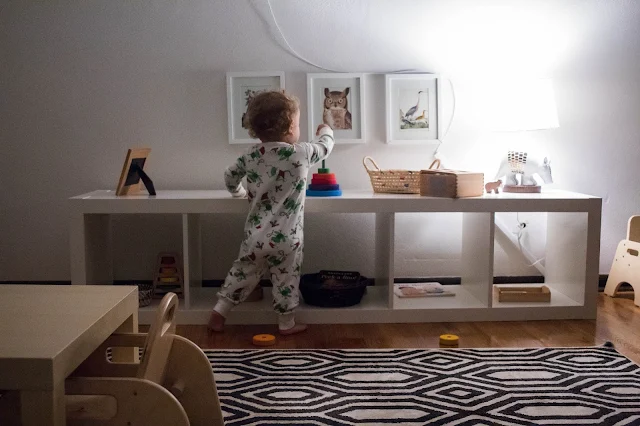Augustus is literally one of my favorite humans on the planet. This child exudes joy, he's charming, smart, and hilarious. He's just amazing. He follows his own developmental path, a long road where we have committed to follow. I've written about this before {here and here} that Augustus has faced some challenges in life -- first with being born with torticollis, having some visual development delay, low muscle tone and gross motor struggles, needing a corrective helmet, and ankle orthodics. One area that is harder to see in pictures that Gus struggles a bit with is speech/language development.
At 22 months old, Gus has wonderful receptive language skills. This means he understands what we are saying to him. He can get things if asked, and otherwise understands language. On the other hand, his expressive language lags behind. This is his ability to communicate with us. Gus has a few words and a couple signs, so he's not super super behind his peers. But, it's a struggle. One that he attends therapy for. The motor planning associated with language (so even signing) is hard for him.
So, this has all been a long way of saying Gus is a little bit different. BUT, the important part is THAT IS OK! It's alright for him to be on his own path. It's alright for him to have areas where he struggles a bit more. We will follow him! We will give him the time he needs, and support his needs through our environment!
If you are in a similar situation here are some things that I have found helpful for me to keep in mind:
- it's alright, I can trust that my child is on his own path and will eventually get where he needs to be, even if it looks differently than other children his age (or my other children)
- use real and descriptive language from birth
- incorporate sign language from a young age - while Gus still struggles with this, it has in some cases given him words where he otherwise had none
- from birth give your baby time to communicate with you. If you ask a question, wait for some sort of communication back. Make a conversation with your child a routine.
- acknowledge communication from your child - get on their level, look them in the eye, and even with their attempts at communication are different, respect that they are still occurring.
And, don't be afraid to seek out help - if you're concerned, ask your doctor or call your local school district. Both can provide services and an evaluation to help assess where your child may need a little extra support. And, if that's the case:
- explain your Montessori values to your therapist - he/she may not be familiar and it's alright to say, "hey, here are some ways we do things a bit differently"
- know and explain your own limits, for example therapeutic rewards/punishments (no one has suggested punishments) are off limits for me. So, that's something I've been up front about so it hasn't been an issue. Another example has been electronic toys. Simply being up front that we don't use them, helps everyone get on the same page and feel comfortable with therapy.
- adapt therapy tools to Montessori! How can I present these tools in a child-led way? How can I make them freely accessible? Can I offer some choice? Sometimes a little creativity and flexibility can help!
- know your rights when it comes to asking for another provider. This hasn't been an issue for me, but I wouldn't hesitate to ask for someone else if my therapist wasn't meshing with our family values.
Montessori is not a race. It's not a way to get your child to talk faster or better. It's about respect, love, patience, and compassion. And we will try to meet Gus with all of these things. Respect for the skills he has and for how hard he is working to get them. Loving him no matter what. Patience that his developmental path is what it is. And compassion for the frustration and struggle that delayed communication skills often brings. This child has taught me so much, and the joy he brings with him is just unbeatable. I'm so grateful he can give it to me, and I'm so grateful that I can give him Montessori.
Do you have a child with language delay or difficulties? Would you add any tips to this list?
---





